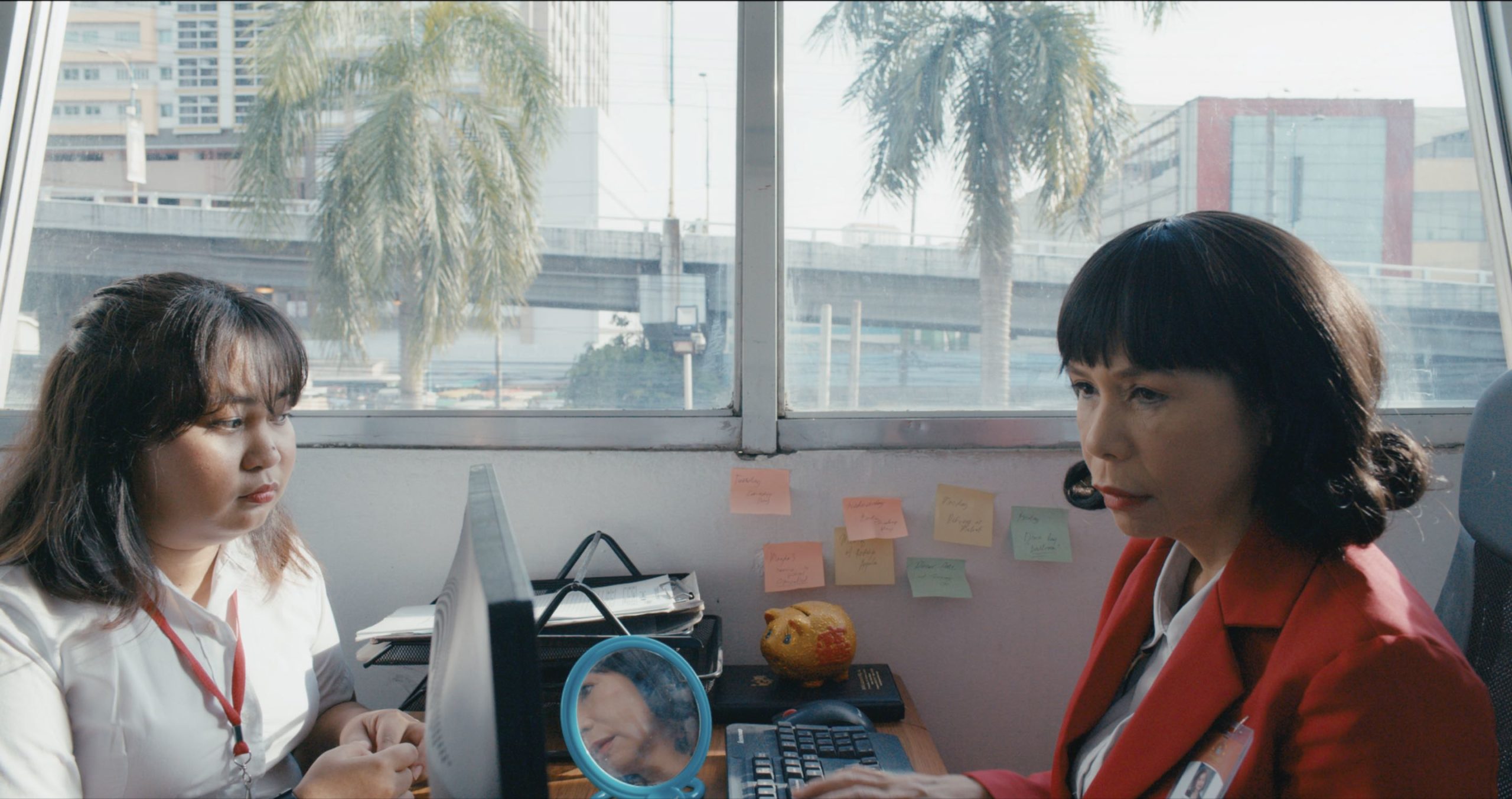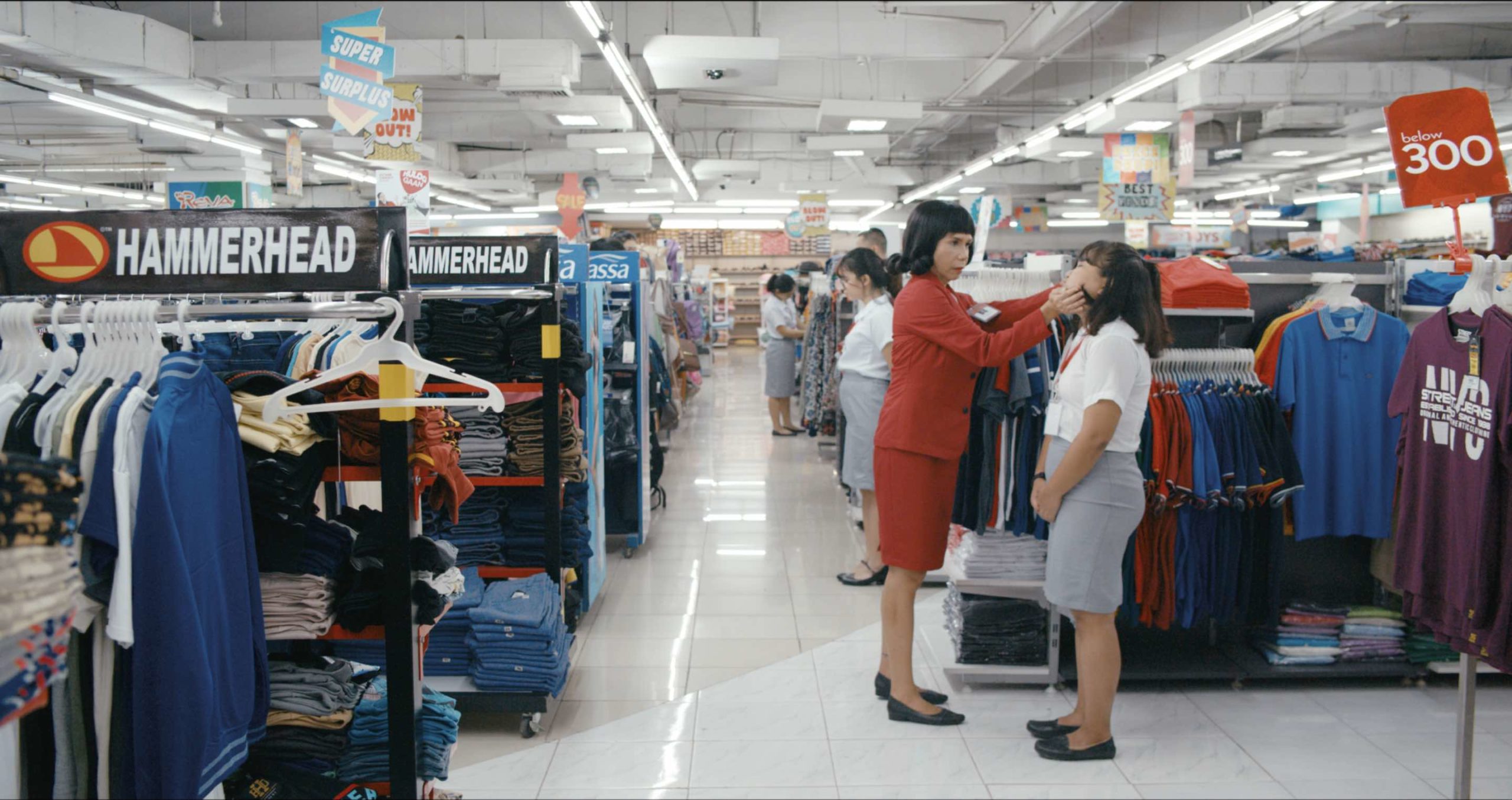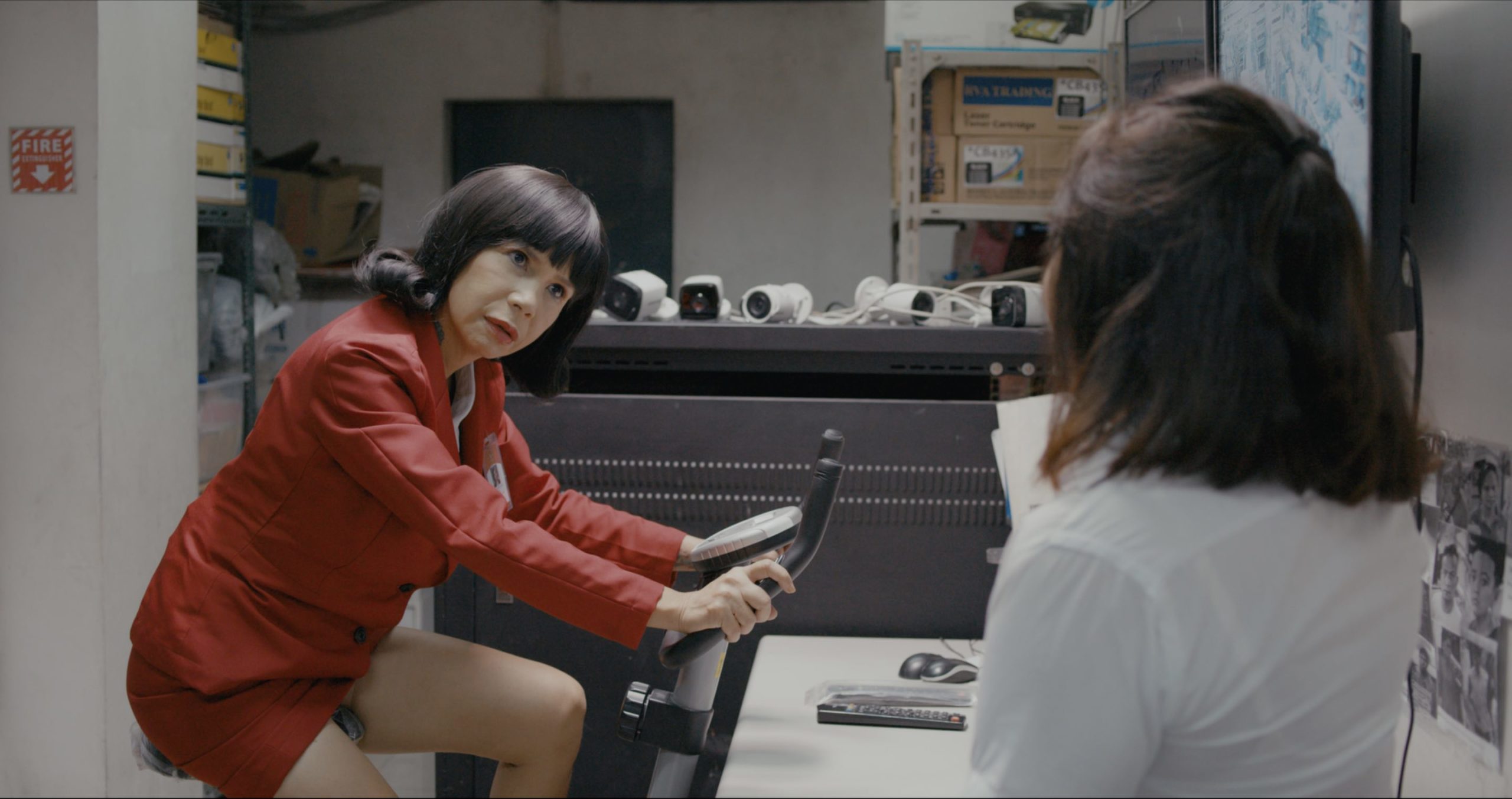On Cinemalaya’s 16th outing, the country’s largest annual independent film festival will be running a digital fest billed with 10 short feature films slated to stream on Aug. 7 to 16.
It’s a tight roster of shorts which have mostly reaped critical acclaim both locally and abroad. Among the interesting films in competition is director Sonny Calvento’s Excuse Me, Miss, Miss, Miss (Yes, with three misses). It’s an emotionally-packed, 16-minute satire on contractual workers’ plight in the Philippines—not that its real-world equivalent is anything to laugh about. Or is it?
“As Filipinos, we’re known to laugh at our problems…I wanted the audience to laugh while watching the film, but also realize that there’s an injustice happening,” Sonny told Coconuts Manila over email, explaining his take on an issue that could have easily been depicted as a drama.
The ABS-CBN teleserye writer turned director is no stranger to the festival, debuting in 2017 as a director for his full-length crime-drama Nabubulok, and returning last year as a producer for the equally acclaimed John Denver Trending.
If Sonny’s last name sounds suspiciously familiar, it’s because he shares it with his late father, true-crime journalist Tony Calvento. While the young auteur has carved out his own niche in the industry, he credits being raised by his father in a mostly agoraphobic setting as a foundation for his unique POV and love for films.
“Because of my father’s job, me and my brother were forced to stay inside our house almost all the time for our safety,” Sonny recalled. “Films then became my comfort, my refuge, and my hope is my films can also bring comfort and refuge to other people,” the filmmaker added.
Coconuts Manila spoke with Sonny in length about the importance of humor in this pandemic, surprising facts about contractual work in the country, and on a side note, his thoughts about his network’s forced shutdown.
Most Pinoy films that tackle workers’ plight tend to be on the serious side but Excuse Me Miss, Miss, Miss is a satire comedy. Was this your original intention?
It happened organically. It was inspired by the experiences of real-life contractual sales ladies of a department store. Their stories are oftentimes heartbreaking but strangely, they told them in a comedic way. There are injustices that happen to them but there is already a level of acceptance to these women when they’ve shared their stories. That for me is even more tragic–that they’ve reached a point to just laugh at their problems because they can do nothing about it anymore. Humor as a sign of helplessness.
One of the common idiosyncrasies of Filipinos is the so-called “Filipino resilience” where we are known to laugh at our problems. While most people consider it a positive trait, I feel like it shouldn’t be like that all the time. I wanted the audience to laugh while watching the film, but also realize that there’s an injustice happening amidst the funny predicaments faced by our protagonist.
Why the three “Miss” in the title, though?
The three misses in the title has something to do with the the twist of the film. Viewers will understand when they watch the film. It’s the surprise to end all surprises. Hahaha!

What facts about contractual work in the country were you surprised to learn while doing research for the film?
A lot! I discovered so many requirements that these workers need to observe as stated in their contracts.
I’ve learned that sales ladies are not allowed to sit down during their eight-hour duty, that pockets on skirts and blouses are not allowed, to the point that they had to hide their handkerchiefs in their undergarments, and that there’s a level of redness of lipstick and make-up that’s considered “presentable” by their managers.
In short, their contract transforms them into products that they are selling. Just like a pair of shoes on a shelf, sales ladies need to look good and behave well all the time even if most of the time, their work environments make it hard for them to do so.
Sixteen minutes doesn’t sound very long, even for a short film. Is it trickier to produce shorts in general? How does directing this compare to full-length films and teleseryes, both of which you’ve also done?
There are stories that are meant to be told in a short span of time, while some are meant to be told in full-length forms. Compared to full-lengths and teleseryes, making a short film is probably the most liberating experience in a lot of aspects. It’s easier to produce short films because it usually only takes one to two shooting days to finish [the] production. The film is usually done before you reach the point of exhaustion. Hahaha!
I feel like [the] short film is the perfect venue to express your voice as a filmmaker, since [in] most cases, you don’t have to take into consideration your audience, or your producers, or your return of investment. There are really small chances of earning back what you spent to finish a short film. And short films usually come in sets, so the pressure of being “liked” by your audience doesn’t rely solely on you.

The film has also been screened in previous festivals locally and abroad, and it’s won an award. Why was it important to enter it again in Cinemalaya?
Cinemalaya is an important film festival for me. I’ve been following the festival since my college years, and the experience of watching Cinemalaya films inspired me to be a filmmaker myself. I want to be an inspiration the same way Cinemalaya directors have inspired me when I was a student.
The audience of Cinemalaya films is expanding from the NCR [National Capital Region] to regional filmmakers and I believe that the efforts of this festival to reach the regions are so important right now so I want to be a part of that advocacy.
I believe that the screening committee had done a great job in curating the ten finalists because each of us offers a different experience, and I strongly feel that we all have voices and issues that we advocate for.
How different is this experience from the other times you were in Cinemalaya as a director for Nabubulok and as a producer for John Denver Trending?
I think what makes this different is that the festival is online this year. For someone who’s not used to attending gala nights because I find it stressful and torturous, I find this better! Hahaha! But of course, you also miss the chance of conversing with the viewers and getting their instant feedback as they watch your film.
It’s been a habit for the past years to go to CCP (Cultural Center of the Philippines) and see fellow filmmakers. It’s the only time of the year to catch up with them. CCP’s been like our home every August and that I think it’s what I will miss the most.
This is also the first time that Cinemalaya is going digital. Personally, what do you feel is good and bad about the idea of a virtual theater?
What’s good is that this will reach a lot more audience because films will be more accessible to them, and in our own little way, filmmakers can do their part of making these viewers stay at home. I’ve been through depression these past months because of the lockdown and I feel like watching films has helped me get through it somehow. I hope the festival will do the same for other film lovers.
What’s bad is of course the chances of having the film illegally copied, but I think the pros outweigh the cons on this one.
Are you excited to see other titles on the roster? Which ones are you looking forward to?
I’ve seen all entries except for two (To Calm The Pig Inside and Fatigued), since most of the finalists premiered in other local festivals, too. So other than the two films mentioned, I am so excited to rewatch Martika Escobar’s Living Things. I’ve always been a fan of her work, I believe she has a very distinct and genuine voice as a storyteller.
I am also looking forward to feeling enchanted again by Carla Ocampo’s Tokwifi. I am excited for everyone to watch Hubert Tibi’s Pabasa Kan Pasyon, because anything that tackles important subjects such as religion and family deserves to be seen. And I’m looking forward to rewatching Jan Andrei Cobey’s The Slums because it’s fun and his actress, Sunshine Teodoro, is a close friend.
How has shooting and producing films and TV series changed since the pandemic? What projects are you currently working on now?
I finished the screenplay of Gospel of the Beast for Black Sheep last April. It’s an action drama film and production has been postponed because of the pandemic.
After that, all the projects for digital and television got cancelled not because of the pandemic but because our government, the Congress, decided to unjustly shut down our network. It’s been so hard to adjust because I feel like I just lost my family. All the directing and writing opportunities I had were because of ABS-CBN. I’m honoring my pain by taking my time trying to figure out what to do next.
We’re sorry to hear that. On the flip side, how much have things changed in the way you personally consume films?
Since I’ve been so focused on my mental health right now, I usually spend most of my time watching comedy televisions shows, thriller, and horror films. I finished binge-watching 205 episodes of The Office and the show really inspired me a lot. I’ve been consciously on the “escapist” mode as a viewer and I’ve been recently avoiding arthouse films because most of these films make us confront our reality, but only until I feel emotionally ready and better again.

You come from a very unique background. What inspired you to make films?
Yes, I grew up in an unusual family set-up, far from the tropes presented in teleseryes and mainstream Filipino movies. A single dad raised me and my older brother. That single dad happened to be Tony Calvento of the Calvento Files, a well-known crime drama show during the ‘90s. Because of my father’s job, my brother and I were forced to stay inside our house almost all the time for our safety.
That’s why, watching Yorgos Lanthimos’ Dogtooth, which is about adults who never left their home, echoed so much of my unique situation. The film made me feel less lonely since it somehow convinced me that our situation was not strange. Because someone also had the same kind of upbringing. Films then became my comfort, my refuge and my hope is my films can also bring comfort and refuge to other people.
And also, writing for teleseryes for eight years also taught me the limitations of mainstream storytelling. As a writer, I always wanted to give voice to the flawed characters and their flawed stories, and television, as a business enterprise, cannot entirely give me that opportunity. Independent filmmaking gives me my freedom. [It also helps me] to tell the stories of the minorities, the misunderstood.
Films give us space for everyone’s stories to be told.
The filmmaker’s responses were lightly edited for flow and brevity.





Reader Interactions